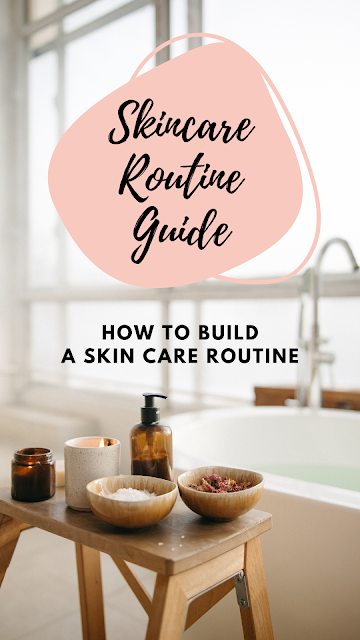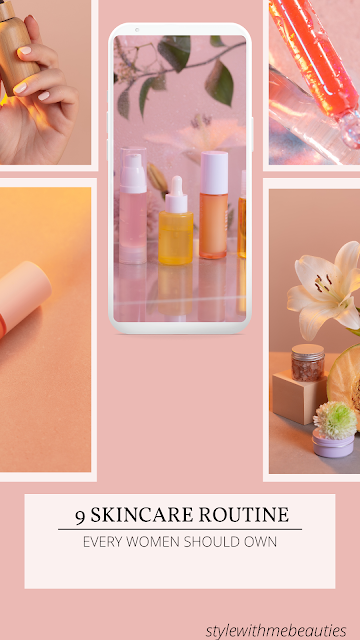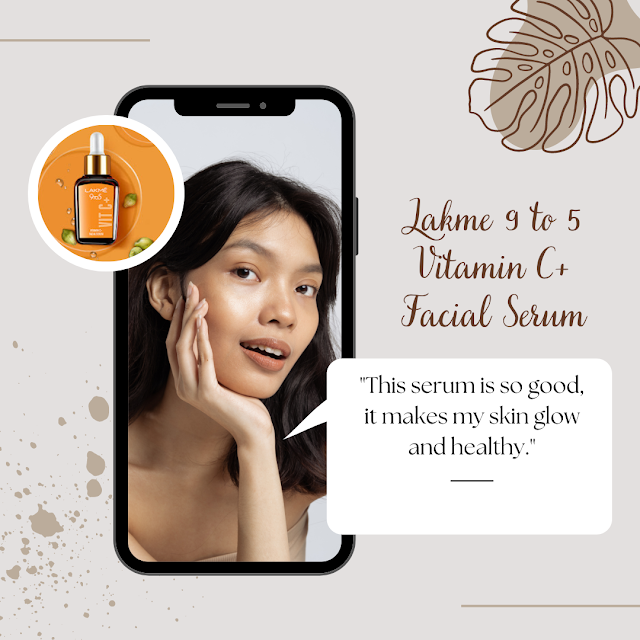 |
| SKINCARE ROUTINE |
9 SKINCARE ROUTINE INGREDIENTS ESSENTIAL IN A BEAUTY REGIMEN
SKIN CARE ROUTINE: Skincare solutions can be purchased to serve a range of skin ailments, needs, and Skin types. Certain skin products might not be appropriate for people prone to allergic reactions, while others might make the skin more sensitive to sunlight.
In order to find the appropriate skin product for them, people need to investigate many options.

9 SKINCARE ROUTINE

1.SPF 30 PA ++
- You've probably heard at least one warning about the necessity of applying sunscreen if you spend any time outside.
- While not wearing sunscreen is preferable to not wearing any, if you have an option, use a sunscreen with at least SPF 30 broad-spectrum UV protection.
- These guidelines apply to persons of all skin tones. Apply sunscreen to your skin 30 minutes before going out in the sun, if possible.
- The sunblock SPF 30 PA ++ offers exceptional broad-spectrum defense against skin-aging UVA Rays and skin-burning UVB rays, enabling you to travel with a smooth, shine-free barrier.
- Sun protection factors abbreviate as SPF. SPF is a factor in sunscreen that helps to protect your skin from the sun's rays.
- UVA and UVB rays are two kinds of radiation emitted by the sun. UVA radiation leads to skin aging symptoms such as wrinkles and drooping. Sunburns causes by more harmful UVB rays. UVA rays also make UVB rays more reactive. Therefore the two can be lethal when combined.
- You are exposed to the sun's harmful rays when you are outside or close to a window with sunlight. Even if you aren't prone to sunburns, that radiation affects your skin.
- SPF protects your skin from the sun's rays by prolonging your skin's natural defenses. For example, an SPF of 15 gives about 15 times more protection than unprotected skin.
- On the other hand, skin not covered by sunscreen receives 50 times less protection from an SPF of 50. Choosing a broad-spectrum sunscreen implies that it will protect from both UVA and UVB radiation.
- Sunscreen is vital for reducing the Negative effects of the sun's damaging UVA and UVB rays. During all outdoor activities, adults of all ages and skin colors should wear at least an SPF of 30.
- Children aged six months above should use cream-based sunscreen with an SPF of at least 30. Additionally, you should not rely just on sunscreen to protect yourself from the sun's rays. Sun protection can obtain by the use of protective clothing and shade.
2. CLEANSER
- A face cleanser is a Skin care product that helps to keep pores clear and prevent skin disorders like acne by removing make-up, dead skin cells, oil, dirt, and other sorts of pollutants from the skin.
- With so many options, deciding on the cleanser might be difficult. Knowing the distinctions can assist you in selecting the finest products for your skin.
- Gel cleansers are transparent and have a gel-like texture. Many contain exfoliating and deep-cleaning characteristics, making them perfect for oily, acne-prone skin.
- Cream cleansers are often heavier and nourishing, washing without depleting the skin of its natural oils, making them suitable for dry or sensitive skin.
- When delivered from a pump container, foam cleansers are lightweight solutions that create a frothy lather. Foam cleansers are gentle and excellent in removing excess oil, making them suitable for mixed skin.
- Because environmental contaminants and cosmetic items that come into touch with skin are not water-soluble, simply washing them with water will not be enough to eliminate them.
- Skin cleansers remove debris, sebum, oil, and dead skin cells from the skin without harming or irritating it.
- Remember to wash your skin every night, and morning, to remove any toxins released by your skin throughout the night.
 |
| SKIN INGREDIENTS |
3. RETINOL
- Retinol has several benefits for your skin, including anti-aging, acne treatment, and general renewal. This multipurpose skincare product derives from vitamin A.
- If you wish to experiment with retinol, keep these two points in mind: Begin slowly and with a light touch.
- Starting with a concentration of 0.05 percent is a good idea.
- Start by applying a pea-sized quantity of product two or three times per week to work your way up to more frequent use.
- If you're worried about increased sun sensitivity, use retinol at night.
- After 1 or 2 weeks, if your skin appears to handle retinol effectively, you can gradually increase the frequency of retinol application to every other night.
- If no Negative effects appear after another two weeks or so, you can start using it every night if necessary. You can restrict yourself to two or three evenings a week if you'd like.
- The benefits of a less frequent application may outweigh the risk of adverse effects.
4. VITAMIN C
- One of the potent anti-aging substances on the market is Vitamin C. Plays a significant role in preserving a clear, even complexion.
- Vitamin C helps maintain the skin lush and firm by accelerating collagen and elastin when administered topically.
- Topical vitamin C can help prevent premature Skin-aging and restore the skin's youthful, smooth look.
5. MOISTURIZER
- Moisturizers are emulsions of oil and water (along with additional components for feeding, treating, and maintaining the skin) that help replace hydration by keeping moisture in the skin and dryness out.
- Even if you don't have dry skin, experts advise that moisturizing is essential for keeping skin young and healthy.
6. TONER WITH BHA/PHA
- The three hydroxy acids occurring in nature, Alpha Hydroxy Acids, Beta Hydroxy Acids, and Poly Hydroxy Acids, refer as- AHA BHA PHA.
- Because they are compounds obtained from nature, primarily from food sources, they are not synthetic chemicals that might be hazardous to your body. As a result, the dangers of toxic substances are no longer a concern.
- These aren't the kinds of acids that will burn your face off. On the other hand, a variety of good benefits to the skin, allowing it to remain lovely and bright.
- Hydroxy Acids are used for exfoliating skin (the process of eliminating dead skin cells from the skin), lowering pigmentation, slowing down skin aging, and removing excess oil.
- Some acids have anti-oxidant and anti-inflammatory characteristics, and others use as sunscreen. These are the common goals of someone who wants to improve their skin's health and appearance.
- Each acid has a distinct characteristic that allows employment for reasons or skin types. Suitable for oily skin, while others are suitable for dry skin. Furthermore, certain acids are appropriate for delicate skin that may react to skin care products.
7.NIACIAMIDE ( VITAMIN B3 )
- Niacinamide is a vitamin B3 (niacin) that helps with energy metabolism and cell health.
- It may provide skin care and skin cancer advantages, also chronic kidney disease and type 1 diabetic benefits. At recommended levels, niacinamide is safe, with minimal adverse effects.
8. AHA -LIKE LATIC ACID
- The most common alpha hydroxy acids used for skin are glycolic acid, the most potent AHAs, and lactic acid.
- While lactic acid derives from milk, it is usually synthetic (and hence vegan) when used in skin care products, according to Markowitz.
9. HYALURONIC ACID
- Hyaluronic acid is a sugar molecule found in abundance in the skin that aids bind water to collagen and retaining it in place, giving the skin a plumper, dewier, and moisturized appearance.
- Hyaluronic acid boosts moisture in the skin, making it seem more youthful, plump, and bouncy.
If you enjoyed this article, I have many others on my website. The following subject could pique your interest:



















.png)


0 comments